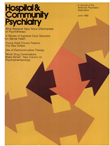Effects of the Urban Crisis on the Community General Hospital
Abstract
The contemporary urban crisis has necessitated a drastic transformation of the community general hospital. The Bronx-Lebanon Hospital Center, in New York, has struggled through this crisis by adapting to the changing needs of the patients it serves. The authors describe the hospital's new emphasis on conditions such as alcoholism, drug abuse, traumatic injuries, high infant-mortality rate, and teen-age pregnancy, and discuss the critical need for community-oriented psychiatric services. Over the past 15 years the patient population has changed, as has the type of service provided, marked by a major shift toward use of the emergency room. Psychiatric services have been expanded at the expense of a more traditional hospital program. One of the few remaining institutions in the decaying inner city, the hospital also becomes the sole provider of medical care as private-practice pbysicians leave. The problems of recruiting and retaining high-level professional staff are discussed, along with the need for the urban general hospital to take a leading part in meeting the enormous demands caused by the continuing urban crisis.
Access content
To read the fulltext, please use one of the options below to sign in or purchase access.- Personal login
- Institutional Login
- Sign in via OpenAthens
- Register for access
-
Please login/register if you wish to pair your device and check access availability.
Not a subscriber?
PsychiatryOnline subscription options offer access to the DSM-5 library, books, journals, CME, and patient resources. This all-in-one virtual library provides psychiatrists and mental health professionals with key resources for diagnosis, treatment, research, and professional development.
Need more help? PsychiatryOnline Customer Service may be reached by emailing [email protected] or by calling 800-368-5777 (in the U.S.) or 703-907-7322 (outside the U.S.).



